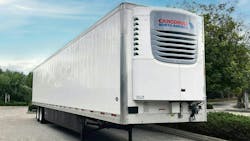How reefer fleets are juggling maintenance and data access
Given that reefer trailers with perishable loads have more regulations and safety concerns to manage, technology offers fleet managers an opportunity to better see and control their businesses. But what happens when the deluge of sensor and camera solutions and telematics platforms feels overwhelming?
Ron Hall, VP of equipment and fuel for C.R. England, finds it frustrating that there are so many platforms and plans for the various data streams every aspect of a trailer can produce, including maintenance tracking, in-cab ELDs, trailer tracking, and tire-pressure monitoring.
“That is becoming an obstacle to me continuing to pursue the kind of evolution of our products that I want to pursue,” Hall admitted.
This struggle was cause for a panel discussion focused on refrigerated vehicles during the 2024 Truckload Carriers Association’s 2024 Refrigerated Meeting. Executives from Knight-Swift Transportation, C.R. England, and Raider Express delved into how reefer fleets can focus their efforts amid a rapidly evolving technological landscape.
Mitigating data overload
When it comes to collecting and using data for reefer fleets, Dave Williams, senior VP of equipment and government affairs for Knight-Swift, emphasized two key points: First, that a certain solution or data access is never going to be a silver bullet for any one issue.
“I’ve rarely found a technology that you can just implement to your business that just fixes something,” Williams stated. “It’s a tool. And if you don’t use it as a tool, then you’re going to find yourself sorely disappointed.”
Second, using that tool means being able to focus on the data a fleet really needs without drowning in (and paying for) too much data to contextualize.
“One of the great skills that each of us has got to develop is to understand where is the data that means something to me today?” Williams explained. “And how am I going to get that data, and what am I going to do about it?”
Finding that needle in a haystack of numbers means identifying pain points in your own fleet, so that you know what data is going to assist you, said Neil Roberts, fleet director at Raider Express.
“Go to your operations people and find out what you can do to help them do their job better,” he emphasized. “There are vast amounts of data that you can pull from, but if you’re not actually improving your operations and allowing your people to do their jobs and do them more efficiently, then the data is not very useful.” Instead, see if your fleet’s technology can speed up mundane or tedious operational tasks. As an example, Roberts now provides his technicians with technology to track their trailers’ location, status, inspection due dates, and more, instead of waiting for them to physically do so during daily yard checks.
Additionally, AI can help manage such tasks or with filtering the massive amounts of data accessible to fleets. For the former, C.R. England’s Hall noted that the company is working on using AI to streamline back-office tasks.
“We’ve actually started the programming and using AI to automate recognition of incoming payments to invoices, because that’s a staff-heavy responsibility to trucking because it’s a complex invoicing process,” Hall said.
And as an example of the latter, C.R. England is working on using AI to review driver vehicle inspection reports (DVIRs) and the images that come with them, so they can more efficiently bill customers if there’s damage to a trailer. Reportedly, the fleet attempted this process with people reviewing the data, but it wasn’t as successful as the AI manager.
Fleet technology and preventative maintenance
One familiar use of technology on trailers is through predictive maintenance operations. Roberts stated that they’ve been using predictive analytics, including data and AI systems, to anticipate breakdowns, to the point where if a truck’s mpg drops, the system knows there’s something wrong.
“These are things that you can capture and get your return on investment,” Roberts asserted.
See also: Late summer maintenance: Areas to address after months of hot weather
Hall stated that he’s even heard about truck OEMs who are willing to warranty a part that’s predicted to fail before it actually does. However, he did caution that these systems can make mistakes. Williams agreed, adding that a predictive maintenance approach may be more expensive than it’s worth, especially if the predicted failure doesn’t happen.
“It depends on where your value is,” Williams said. “If you value timeliness or having zero breakdowns extremely highly—say you’re a business that offers expedited delivery—that’s a huge thing for those. But most of our businesses can absorb some failures here and there.”
Not to mention that there’s the added expense of predictive maintenance anticipating a component fault across several of a fleet’s vehicles. In that case, can the fleet in question afford to handle multiple replacements simultaneously an effort to avoid a breakdown?
“It’s really expensive to get to zero failures,” Hall noted wryly.
The race to upgrade
With these technological pros and cons in mind, what should reefer fleets look for when considering a new solution? And what do suppliers need to understand when they meet with customers?
“The first thing we ask when we’re looking for telematics providers or any kind of technology is ‘What is our availability to data?’” Roberts said.
And all the better when multiple data streams are combined into one through a single platform.
“It’s forcing those folks to talk to each other so that we can use the same transmitter on the truck and trailer to get that data,” Hall maintained.
While fleets still have to go hunting for that data collection experience, there are a couple options for reefers that come close.
For instance, Cargobull North America is offering its CARB-compliant transport refrigeration unit models 625 and 655 MT, which can be paired with Utility Trailer Connect. The platform provides insights into temperature monitoring and control, predictive maintenance alerts, battery and fuel status updates, door controls, and trailer geolocation, among other features.
“We put the first [Cargobull TRUs] in service in January and other than a battery issue that was replaced the next day, they did absolutely flawlessly,” said Lyn Simon, president of Simon Transport. “My maintenance guys love the portal, or front end, as they call it. All the data that you could ever ask for is right there, and [Cargobull’s] monitoring team knew before we knew that battery had an issue.”
Another option is Orbcomm’s GT 1220 trailer tracking and PT 6000 refrigerated trailer tracker. These devices monitor various aspects of a vehicle, including rapid fuel loss, extended usage, and cargo access and theft.
“We’ve seen temperature fluctuations or out-of-range temperatures, fuel analytics, and then we pair all of that with the geofences to make sure the information we’re receiving is pertinent and accurate,” said Deen Albert, VP of operations for Grand Island Express, which is using both the GT 1220 and PT 6000. “All those things come into play for us. And depending on the alert, different departments in our organization take care of those things.”
The location features are especially helpful to Albert, whose “worst nightmare” is when an expensive load ends up going 300 miles in the wrong direction due to simple human error.
“And that’s happened to us several times,” Albert said. “So, we feel that this is a really necessary investment for us to get ahead of those situations.”
This article was originally published on FleetOwner.com.
About the Author

Alex Keenan
Alex Keenan is an Associate Editor for Fleet Maintenance magazine. She has written on a variety of topics for the past several years and recently joined the transportation industry, reviewing content covering technician challenges and breaking industry news. She holds a bachelor's degree in English from Colorado State University in Fort Collins, Colorado.


